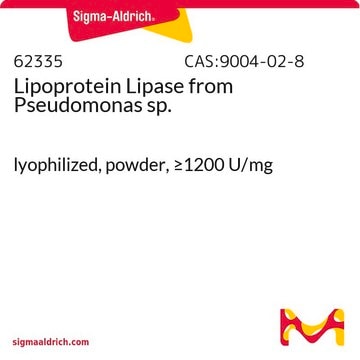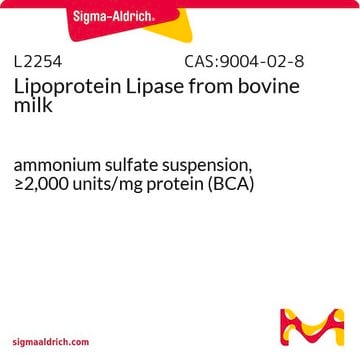62336
Lipoprotein Lipase from Pseudomonas sp.
lyophilized, powder, yellow-brown, ≥160 U/mg
Sign Into View Organizational & Contract Pricing
All Photos(1)
About This Item
Recommended Products
biological source
bacterial (Pseudomonas spp.)
Quality Level
form
powder
quality
lyophilized
specific activity
≥160 U/mg
color
yellow-brown
storage temp.
−20°C
Looking for similar products? Visit Product Comparison Guide
Biochem/physiol Actions
Lipoprotein lipase belongs to the family of triglyceride lipases. It hydrolyses triglycerides in triglyceride-rich ApoB-containing lipoproteins.
Unit Definition
1 U corresponds to the amount of enzyme which liberates 1 μmol of oleic acid per minute at pH 8.0 and 37°C (cholesteryl oleate, Cat. No. 26850, as substrate)
Storage Class Code
11 - Combustible Solids
WGK
WGK 3
Flash Point(F)
Not applicable
Flash Point(C)
Not applicable
Personal Protective Equipment
dust mask type N95 (US), Eyeshields, Gloves
Certificates of Analysis (COA)
Search for Certificates of Analysis (COA) by entering the products Lot/Batch Number. Lot and Batch Numbers can be found on a product’s label following the words ‘Lot’ or ‘Batch’.
Already Own This Product?
Find documentation for the products that you have recently purchased in the Document Library.
Joni Agustian et al.
Chirality, 24(5), 356-367 (2012-04-21)
Because chiral liquid chromatography (LC) could become a powerful tool to estimate racemic atenolol quantity, excellent enantiomeric separation should be produced during data acquisition for satisfactory observation of atenolol concentrations throughout the racemic resolution processes. Selection of chiral LC column
Jonghan Kim et al.
FASEB journal : official publication of the Federation of American Societies for Experimental Biology, 27(4), 1657-1663 (2012-12-18)
Iron loading is associated with altered lipid metabolism, but underlying mechanisms remain unknown. We compared serum iron and triglycerides (TGs) in Belgrade rats, a genetic model of iron-loading anemia. Homozygous b/b rats had greater serum iron (68 vs. 28 μM;
Autocrine endocannabinoid signaling through CB1 receptors potentiates OX1 orexin receptor signaling.
Maria H Jäntti et al.
Molecular pharmacology, 83(3), 621-632 (2012-12-13)
It has been proposed that OX(1) orexin receptors and CB(1) cannabinoid receptors can form heteromeric complexes, which affect the trafficking of OX(1) receptors and potentiate OX(1) receptor signaling to extracellular signal-regulated kinase (ERK). We have recently shown that OX(1) receptor
Sajjad Rafiq et al.
Lipids in health and disease, 11, 155-155 (2012-11-16)
Genome wide association studies (GWAS), mostly in Europeans have identified several common variants as associated with key lipid traits. Replication of these genetic effects in South Asian populations is important since it would suggest wider relevance for these findings. Given
Sumita Jain et al.
Infection and immunity, 81(4), 1277-1286 (2013-02-06)
Infection by the chronic periodontitis-associated pathogen Porphyromonas gingivalis activates a Toll-like receptor 2 (TLR2) response that triggers inflammation in the host but also promotes bacterial persistence. Our aim was to define ligands on the surfaces of intact P. gingivalis cells
Our team of scientists has experience in all areas of research including Life Science, Material Science, Chemical Synthesis, Chromatography, Analytical and many others.
Contact Technical Service








